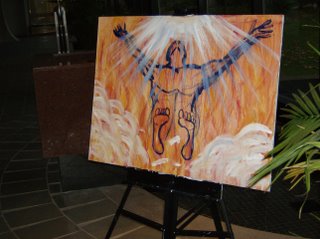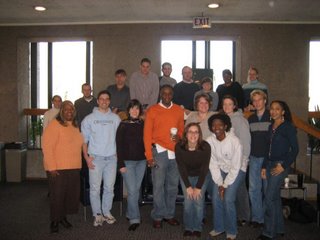I like to give parties. People who know me well have to have at least attended one of my parties and seen me giving one from the inside. So my roommates are being very good sports because they are helping me throw a party right in the middle of writing papers and studying for finals. So I am having an advent party. And all I can think about during my spare time is getting all the details in order so that when I come back from Thanksgiving things will be in order for the party.
And we have a nice apartment, frankly one of the larger ones on campus, but it is limited in size. And, between the three of us and my roommate from last year who is helping throw the party, there are a great many people that we are friends with. Suddenly, we realized we cannot invite everyone. This is a very sobering thought, almost enough to make us not give the party. In fact, one of my roommates suggested we just not throw the party because we have 150 people on the guest list and have to cut because we can't even afford to have that many people. And because so many of us live in close proximity and because last year we had a 80% turn-out rate, we know we have to cut names. How can we cut out people? We had wanted to invite the people that we don't know very well, the quiet ones, the ones who don't often get invited to the little suppers we have at our house or the game nights that spontaneously come up. Because those people do exist, even here. And we are finding ourselves cutting them because their feelings seem less likely to be hurt than someone who has heard us mention the party already, or someone who lives with someone who has heard us mention the party already, or the spouses of someone who heard us mention the party already. So some people are getting left off and it has nothing to do with their relative worth as people and it is an unfair criteria that we invite the people that are just most like us and happen to be the ones we know and like best.
So should we just give up the idea altogether?
Recently, I had my students at DePaul read "A Modest Proposal" by Jonathan Swift. That's the famous baby-eating satire. At the time the essay was written, British colonialism of Ireland was at its zenith. Swift wrote that the Irish should start selling their babies at one year of age for food for the English landlords. He also suggests tender care of the children for the first year so the "hides" can be used for ladies' gloves. You cannot get a more jarring look at exploitation of people than in that essay. When we were talking about how Swift uses language that equates the babies to animals in the essay, I asked my students if this essay has any application in modern times. And eventually we came to the conclusion, in both classes, that the "bums" or "homeless" in the streets here in Chicago are treated similarly. And the students puzzled about what to do. Some said the government should take care of the problem, but others suggested that this solution was only passing the buck and probably not practical. Others suggested that the bums ought to get jobs, but this elicited critique from others who thought this solution missed the complexity of why people are on the street. Most suggested that they couldn't possibly give money to everyone who asked for it and some pointed out that a few of the "bums" were just trying to buy alcohol or were people trying to rip off easy marks. The final consensus was that there wasn't really a solution posed in Swift's essay, nor could the students discover--in one class period-- a solution to the homeless problem either (which in some ways is a relief because if the solution could be puzzled to that easily, what have we been doing for the last two or three millenia?) But there was a sense that the dehumanizing of the "bums" was bad. A few said that they felt they should at least talk to the people on the street, not ignore them.
And again I ask whether, faced with such incredible unfairness over who gets the benefit of the few coins you do have in your pocket and the perils of not knowing if the particular homeless person you approach will hurt you or put your funds to improper use, whether, faced with these limitations, the whole enterprise ought to be abandoned.
Should we just give up the idea altogether?
I like to put change in the bellringers' buckets at Christmas time. I never put nearly as much change in the buckets as I spend in the store on things like wrapping paper and bows and cards and stocking stuffers, but it makes me FEEL good for doing it. Makes me feel like I was GOOD. And the bell ringer smiles at me. I MUST be good. But despite my inadequate gift, somehow good IS DONE with the bellringers' money.
We talk in seminary about how we are all priveledged here in the U.S. and how we should help the people with less and how we ought to share better and give of ourselves. And it's true. There are a great many things we have that we don't need, don't really even want, can't take care of, distract us from each other and God. The beatitudes, in the Matthew version, talk about the "poor in spirit" and make me think that maybe my definition of "poor" might be too small, especially when thinking about other passages in the Bible and when thinking about the movement in theology to focus on care for the poor. Certainly providing for the economic well-being of all of God's people is not something we humans do well. Never really have. But I wonder if the poor could also be those people who don't get very many invititations to Christmas parties, the overweight woman who never gets asked on a date, the lonely, the ones who feel useless, or even George W. Bush-- who has a lot of responsibility and is being told in no uncertain terms that most people in the WORLD believe he is a collossal failure, stupid, wicked, that the world is a worse place because of his life, and that almost anyone else could have done a better job.
I don't know how to solve the problem of the homeless. I don't know if I should abandon the whole Christmas party concept because I can't invite everyone and only continue to support the social institutions that allow some people be invited to more things than others. The only consesus I can come up with is that at least this Christmas when I actually take those too-few moments to think of the greeting-card sentiments of the season and those less fortunate than me, I will try to think of all of those less fortunate than me-- in all the powerful and horrible ways that people can be poor or poor in spirit-- and try to remember not to dehumanize them.


